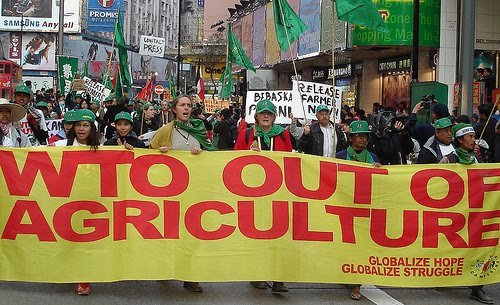Key Drivers of Food Insecurity in the 21st Century: THE NEOLIBERAL FOOD SYSTEM

The NFS is a key geopolitical driver of food insecurity today and will continue to be unless international political changes are made addressing its inherent inequalities. Neoliberalism acts as a primary driver affects food insecurity through its unequal effects on the access to agricultural land and food prices. As a secondary driver, it can exacerbate and increase the risk of food insecurity through its impacts on conflict and climate change. According to neoliberal economic theory, when a country follows its comparative advantage and opens its internal food markets up to the competition in the global market and large food and agribusiness, countries through trading, will be able to establish food security (Kılıc, 2002).
However, in practice the NFS as a primary driver has driven and will most likely continue to drive many developing countries to become food dependent making them increasingly vulnerable to supply shocks and price volatilities (Sodano, 2012). Most SSA countries who entered the global market at a later stage, either through their own volition or structural adjustment programs pushed by the World Bank and IMF, had internal markets that were often not as developed and resistant to the competitive prices of developed countries (Clapp, 2014).
Additionally, their comparative advantage has often been reduced to raw materials, low value-added products and volatile primary commodities (Clapp, 2014). Whereas developed countries have followed their competitive advantage and have a diversified market, specializing in high value-added products (Bieler, 2015). In 11 countries in SSA imports accounted for more than half of grain supplies, with many of them spending more than $35 billion on food imports annually and this is estimated to rise (Munang and Han, 2015). The unequal structure of the NFS, besides influencing food prices and external food dependency, has led to a continuing growth in agribusinesses. Agricultural production businesses affect both the availability and accessibility of food in many developing countries with a large agricultural sector. According to Bieler (2015), many agribusinesses crowd out small-scale farmers depriving them of subsistence or the creation of an income through selling agricultural products. The inequalities in the NFS act as primary drivers for food insecurity in agriculturally oriented developing countries by highly influencing people’s access to food.
As a secondary driver, the NFS has in extreme cases contributed to conflict and/or climate change which can have a cumulative effect on the likelihood and/or severity of food insecurity. The inequalities that the NFS produces can induce and contribute to local disputes and national conflicts in vulnerable situations through increased competition over the access to food and agricultural land (Brinkman and Hendrix, 2010). Additionally, high food prices can play a role in causing social unrest creating political and social instabilities, further reducing access to food (Brinkman and Hendrix, 2010). International Alert (2017) conducted research and found that around 42% of the land deals agribusinesses made were taking place in conflict-prone and conflict-affected areas, mostly in Africa. They found that agribusinesses in already conflict-prone areas can increase the chances and likelihood of conflicts over access to land, and subsequently influence food insecurity.
With regards to climate change, there is a consensus amongst the natural sciences that increases in the global temperature are for a large part due to negative production and consumption externalities of the capitalist neoliberal system, which includes food production and consumption (Clark and York, 2005). Many climate change effects have affected SAA countries disproportionately as coping mechanisms are underdeveloped (Gregory et al., 2005). Although the extent of the role of neoliberalism and the NFS in exacerbating and causing climate change can be contested, the capitalist mode of production and expansion has contributed to climate change (Fletcher, 2012). Through influencing, conflict and climate change the NFS can play a role in increasing the chances and outcomes of food insecurity.
To address the inequalities of the NFS as a primary and secondary driver of food insecurity, an increased focus on internationalized political solutions is necessary. However, it should not just be limited to an investigation of the failures of the system but should also look at what makes this food system function and how the food insecurity of some is at the heart of food security and wealth of others. While Amartya Sen’s (1981) “new famine” theory, reconceptualizing famine and food insecurity, has been important in shifting away from the focus from mere supply problems to issues of access, “famines are still seen as failures of food supply” (Edkins, 2002:13).
Sen had not considered that food insecurity “could be a product of the social or economic system rather than its failure” (Edkins, 2002:13). The NFS has many negative consequences on food insecurity that can only be addressed by restructuring global governance institutions and ensuring equality in decision-making power for developing countries in organisations such as the World Trade Organisation.